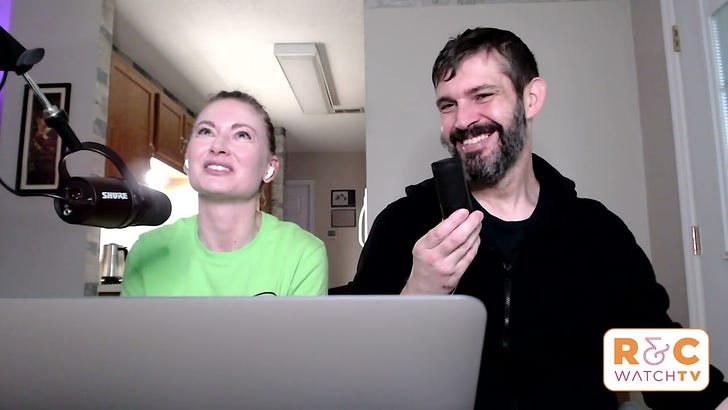Watch me read this:
I couldn’t stop thinking more about adultery after our last TV Tuesday. Honestly it’s such a fascinating topic to me.
Another thing that’s interesting about cheating is that, empirically speaking, (and we do try to speak empirically over here) we don’t really know that much about it. It’s actually kind of hard to study.
There are at least two aspects of cheating that challenge researchers.
The first is that different people define “cheating” differently.
For some people, emotional intimacy counts as cheating. This is sometimes referred to as an “emotional affair.” Some people think kissing is fine, while for others it’s not cheating until a penis goes into a vagina *coughs in Bill Clinton*.
In my humble opinion, I’d define cheating as doing something sexual that you agreed not to do.
But measuring that would require that research subjects had proactively delineated what they’re “allowed” to do with other people. And, as far as I can tell, most people are, in the parlance of our times, not ready for that conversation. Which is as unfortunate as it is understandable.
But whereas a couple can just make assumptions and go about their lives until something happens to force the conversation, a researcher has to turn assumptions into explicit categories.
The second thing that makes researching infidelity difficult is that people lie about cheating. Breaking. More at 11.
So, between people interpreting the same question very differently and lying about their behavior, empirical estimates of what percentage of people cheat vary from like 2% to 80%.
I think the other requirement for something to be “cheating,” for me, is to not tell your partner about it. I think the very term cheating implies getting away with something. I got to have forbidden sexual contact with other people while you didn’t.
Think about cheating at a card game, for instance. If you break a rule and immediately tell the other player/s it’s annoying to them. But it’s absolutely not the same as winning and taking the reward without ever saying anything.
So it was with me when I got cheated on the one time I know about.
What killed me wasn’t the sex, perhaps not shockingly. It’s that he had months to tell me and never did. Another ex of mine had to. Which was, as you might imagine or perhaps have experienced, fairly humiliating But looking back, what really sucks is that he wasted so much of my time and energy.
I was inspired to write about adultery in the TV Tuesday post after watching Alicia in The Good Wife think about what her husband found in his side piece that he couldn’t get from her. It made me think about the narcissism inherent in thinking someone’s cheating is all about you. And it reminded me of my own experience.
For years after the cheatening, I was too blinded by my own pain to see the pain and anger he’d been feeling when we were together. I am so grateful to him for having a few clearing conversations with me in the years since.
When we were dating, I would tell him he could say anything to me as long as he believed it was true. In the years afterward, I realized that nothing I did or said or was caused him to lie. He was just too spineless to tell the truth.
The last interesting thing about cheating I want to cover in this post is that, at least by own own definition, (which I think is quite defensible) I’ve never cheated on anyone. I’ve certainly broken sexual agreements. But as far as I can recall, I’ve told my partner immediately every time.
I’m not sure exactly why that is, to be honest. Maybe it’s an empathy thing.
But there’s a selfish portion as well. I think I’m also viscerally disgusted by the idea of being in a relationship predicated on a lie.
At the same time, it seems clear to me that sex is special to me. It’s not like I tell every person I date every single thing I think might put them off of me. I don’t immediately tell my partner every time I break any kind of agreement. If you ask me to ask someone for something by a certain date and that date passes and I haven’t done it, am I going to hope you don’t ask me about it? Yeah, probably.
But sex is different. I want to know my partners’ sexual past and present and I want them to know mine. Because it’s interesting and because it helps me feel safer to know.
I don’t like feeling like I’m hiding another lover. Under those circumstances, every time my partner told me they loved me it feels like they’d be telling just the part of me they know about. I don’t know. That doesn’t feel like enough to me. It feels stressful and wrong.
When I try to occupy the headspace of someone who chooses to cheat, I can only imagine their partner is giving them something somehow more valuable than loving the real them. It feels, again, less like they don’t love their partner enough and more that they don’t love themselves enough to be in something where they can be their full sexual selves.
Or, maybe I suffer from a failure of imagination. Possibly both.
Sex and the State is a newsletter at the intersection of policy and people. Like it? Upgrade to a paid subscription, buy a guide, follow me on Twitter, support me on Patreon, or just share this post 🙏
~~~~~
This ⬇️ is an affiliate link! Sign up today to support me!
Join the reading revolution! Get key ideas from bestselling non-fiction books, distilled by experts into bitesize text and audio. Explore our vast library of over 5,500 titles and stay up-to-date with 40 new titles added each month.
















Share this post